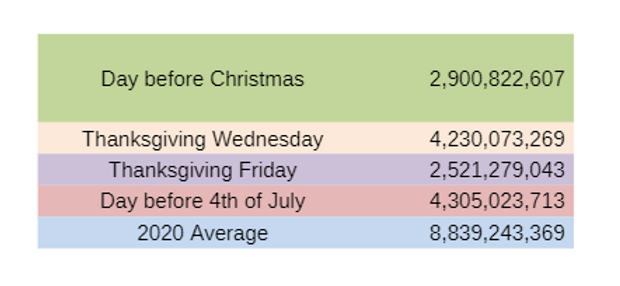U.S. financial markets are closed on Thursday this week for the Thanksgiving holiday and will shutter early on Black Friday but despite a pandemic and huge volatility this year in markets, investors and traders may not need to search too hard for reasons to be thankful.
Check out: 16 ways to throw together a smaller, no-fuss Thanksgiving dinner at the last minute
Indeed, the Dow Jones Industrial Average DJIA, +0.18% on Wednesday touched a historic milestone at 30,000 as investors focused on progress towards a coronavirus vaccine and the likelihood that the viral outbreak can soon be placed in the rearview mirror.
Investors have also fretted about the bumpy road to a Biden administration given President Trump’s refusal to concede the Nov. 3 election.
So a brief respite may be just what the epidemiologist prescribed.
Beyond Thursday’s closure, since 1992, stock exchanges have adhered to an abbreviated trading schedule the Friday after Thanksgiving in the U.S.
The New York Stock Exchange and the Nasdaq will close at 1 p.m. Eastern time on Friday, while the Securities Industry and Financial Markets Association recommends a 2 p.m. Eastern close for bond markets TMUBMUSD10Y, 0.855%.
The major U.S. exchange operators—the Intercontinental Exchange-owned NYSE ICE, +0.48%, American Stock Exchange, and Nasdaq NDAQ, -0.49% —initially called for a 2 p.m. Eastern close for the Friday after Thanksgiving in 1992, two hours earlier than the normal 4 p.m. closing bell. But the following year, exchanges opted to shutter markets three hours earlier, at 1 p.m.
Black Friday is the official start to the holiday shopping season, with many retailers offering bargains for those looking for holiday gifts.
There is a good reason for the early closures.
Read: The best Black Friday deals at Walmart this year
See: 5 items NOT to buy during Black Friday
Overall, trading activity on the Wednesday before Thanksgiving and the Friday afterward are usually a fraction of what it is during normal, non-holiday trading periods. Here’s a look at the average trading volumes since 2010 on the day before and after Turkey day (as well as July 4 and Christmas Eve), per Dow Jones Market Data:

That said, the market’s performance in recent years during the week of “Turkey day” has been higher more times than not.
The Nasdaq Composite Index COMP, +0.70%, for example, has finished higher 69% of the times from Thanksgiving week. Similarly, the S&P 500 index SPX, +0.24% ends up 69% of the time, a trend dating back to the index’s inception in the 1950s, while the Dow is up 63% of the times. Gains
Many Americans are still planning to fly and travel this year despite a spike in COVID-19 cases and the urging of the Centers for Disease Control and Prevention to not travel for Thanksgiving.
In other markets, there is U.S. floor trading for metals GOLD, -1.18% and energy futures CL.1, -1.09% on Comex and the New York Mercantile Exchange on Thanksgiving Day.
On Black Friday, metals will settle at 12:30 p.m., and U.S. crude oil will settle at 1:30 p.m.











